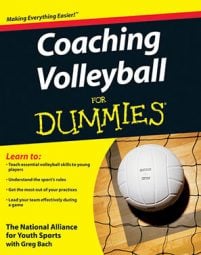You need to know which essential items to take to a practice, how to hold volleyball practices that keeps players engaged, and how you can deliver inspiring game talks that will motivate the team.
5 items volleyball coaches should take to practice
What use is volleyball practice if the coach is unprepared or if the only ball is damaged? For each practice, volleyball coaches should have a solid plan and some critical supplies to ensure players get the most out of it. Here’s a quick look at the essentials:
-
A practice plan with drills broken down by time segments.
-
A list of reserve drills in case any of your scheduled drills are ineffective.
-
Extra volleyballs.
-
A whistle.
-
A properly stocked first-aid kit, including bags of ice, bandages, latex gloves, sterile gauze, and athletic tape.
9 coaching tips for making volleyball practice fun
To help your young volleyball squad develop skills and learn key techniques of the game, you need to craft practices that the kids want to be a part of.
Your practices — if they’re fun and productive — are the launching pad for a truly rewarding season.
Consider these tips to run practice sessions that challenge, entertain, and motivate players to reach their full potential:
-
Always plan your practices in advance so you don’t waste valuable time on the court.
-
Give each child plenty of repetitions in a variety of different areas of the game.
-
Keep the kids active throughout the session; don’t force them to stand in lines.
-
Periodically involve the parents in drills to rev up the excitement and boost the energy levels of the kids.
-
Sprinkle your practices with new drills throughout the season to maintain the kids’ interest and to keep pace with their progress.
-
If drills turn out to be boring or ineffective, discard them and switch to new ones.
-
Solicit feedback and ideas from the older kids on drills you should use.
-
Applaud the slightest improvements to maintain your kids’ interest.
-
Conclude practice with a popular drill to end the session on a high note.
How to deliver motivational game talks
If you’re a volleyball coach, strive to deliver great game talks, whether pregame, mid-match, or postgame. Two messages are critical to each delivery: motivation and positive thinking.
Talk the pregame talk
A great pregame speech — one that has kids on the edge of their seats and filled with excitement to take the court — is a great way to begin the game. Getting the best effort out of all your players every time they take the court can be a real challenge at times, but remember that you’re fully capable of handling it.
Just keep in mind that your motivational pregame talk needs to pull the players together to work as a team and to want to help one another.
The following tips help ensure that your pregame words hit home and produce the effect you’re shooting for.
-
Speak to the kids in a calm and relaxed manner; talk to them away from any distractions.
-
Stress the importance of having fun and displaying good sportsmanship at all times.
-
Focus your talk on areas of the game the kids excel in.
-
Be passionate and enthusiastic — your excitement will carry over to your players.
Give your mid-match talk
A volleyball coach needs to keep an energetic level of play going all game long, even on those days when your team’s blocking is falling apart, its passing is erratic, and its offense isn’t producing points.
Being a constant source of motivation for the players helps keep them focused and involved in every aspect of the game, which helps keep them performing at higher levels.
Keep the following do’s and don’ts in mind when trying to motivate your players throughout the game.
-
Following an opening game win, applaud the kids’ effort, and challenge them to raise their level of play another notch in the ensuing game to avoid complacency.
-
After dropping the first game, don’t dwell on mistakes; instead, focus on what your players did well, and encourage them to continue hustling, concentrating, and giving their best effort on every point.
-
When switching strategies, don’t go overboard with changes. Giving the kids too much information to process can put them out of sync when play resumes.
-
When the match is headed to a deciding game, focus the kids’ attention on what they have performed well so they take the court with positive thoughts.
-
No matter what happened in the first or second game, remind them to consume fluids to stay hydrated.
Polish your postgame talk
What you say to your team following a game and how you say it has a big impact on the kids because that message resonates in their heads until the next time they step onto the court.
Regardless of whether your team won or lost, played great or turned in one of their worst performances, one of your most important responsibilities as their coach is sending the players home feeling good about themselves in some way.
When meeting with your team after the game, remember these points:
-
Keep the focus on fun at all times.
-
Reinforce that making mistakes is part of the learning process at every level of volleyball and accentuate the positive.
-
Highlight displays of good sportsmanship.
-
Ignore the scoreboard and don’t allow it to dictate your mood or the way you address your players. Remember that the kids are always more important than wins and losses.
-
Be sure your message ends on a high note so the kids look forward to gathering with you for the next practice or match.

